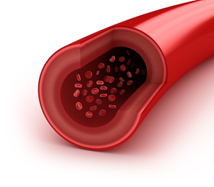Reverse Heart Disease?
Author: Dr. Stephen Chaney
Nitric oxide has had a meteoric rise from obscurity to fame in just a few short years. It’s an amazing story. After all, nitric oxide is a colorless, odorless gas. Who could have known it was destined for greatness? In this article, we will discuss nitric oxide benefits and side effects.
Its rise to fame started in the 1980’s when scientists from several universities discovered that nitric oxide was an important regulator of numerous physiological processes. Just a few years later in 1992 Science magazine named it “Molecule of the Year”, a very prestigious honor. And, in 1998 three of its co-discoverers received the Nobel Prize for their ground-breaking research.
The Benefits of Nitric Oxide
Proven Benefits
Perhaps the most important benefit of nitric oxide is its role in maintaining the health of the endothelial cells that form the inner lining of our blood vessels. Nitric oxide reduces:
- Platelet aggregation
- Damage & inflammation of the endothelial cells
- Oxidation of LDL cholesterol
- Growth of smooth muscle cells.
This is important because these are the very physiological processes that, if left unchecked, can lead to atherosclerosis and disease of the cardiovascular system (Davignon and Ganz, Circulation, 109: 1127-1132, 2004; Tousoulis et al, Current Vascular Pharmacology, 10: 4-18, 2012).
However, the effect of nitric oxide that has gotten the most attention is its ability to relax the smooth muscle cells that surround our blood vessels. That leads to increased blood flow, which in turn decreases blood pressure, relieves angina, and even prevents erectile dysfunction (Davignon and Ganz, Circulation, 109: 1127-1132, 2004; Tousoulis et al, Current Vascular Pharmacology, 10: 4-18, 2012).
Possible Benefits
Many people with atherosclerosis, diabetes and hypertension (high blood pressure) have low nitric oxide levels. It’s not known whether this is a cause or a result of these diseases, but low nitric oxide levels certainly could contribute to the progression and health consequences of all three diseases. We already know that increasing nitric oxide levels can reduce high blood pressure. It is not yet known whether increasing nitric oxide levels could reduce or reverse heart disease and the effects of diabetes, but this is an area of active research.
Nitric oxide is a neurotransmitter and is thought to play a critical role in memory and learning. It also plays a critical role in immune function. In addition, it enhances the metabolic activity of mitochondria, which could enhance cellular metabolism. The physiological significance of these observations is unknown, but this is another area of active research
Finally, because nitric oxide stimulates blood flow, which should increase oxygen and nutrient delivery to active muscle, it has been suggested that nitric oxide supplements would improve sports performance. The results of clinical studies to test this hypothesis have been mixed. The latest research suggests that nitric oxide supplements may enhance performance in untrained or moderately trained subjects, but not in highly trained subjects (Bescoe et al, Sports Medicine, 42: 99-117, 2012). At last, a sports supplement for the common man!
Drugs That Affect Nitric Oxide Levels
Because nitric oxide has such powerful physiological effects, the pharmaceutical industry has been busy creating drugs that either increase nitric oxide levels or increase the biological effectiveness of nitric oxide. For example, these include drugs to treat angina, hypertension, pulmonary hypertension and erectile dysfunction.
These drugs are generally effective, but have some drawbacks, namely:
- They have numerous side effects. For example, just listen to the Viagra or Cialis ads on TV.
- Some of them lose their biological effectiveness over time, especially the angina medications.
Natural Approaches for Increasing Nitric Oxide Levels
 There are two natural pathways for generating nitric oxide in the body.
There are two natural pathways for generating nitric oxide in the body.
1) The first pathway is an enzymatic process that oxidizes a nitrogen atom in the amino acid arginine to nitric oxide.
2) The second pathway is a non-enzymatic process in which naturally occurring nitrates and nitrites are reduced to nitric oxide either by bacteria in the mouth and intestine, or by naturally occurring antioxidants.
Arginine is found in proteins. The best protein sources of arginine are red meat, soy, crustaceans (crab, shrimp & lobster), nuts, spinach and lentils. In addition, you can find arginine supplements and arginine-enriched protein supplements.
The best natural sources of nitrates and nitrites are vegetables, especially spinach, beet root and arugula followed by green leafy vegetable and root vegetables in general. Vegetables provide about 80% of the nitrates and nitrites in the American diet.
Nitrates and nitrites do not appear to have the side effects of the nitic oxide producing drugs. This is probably because their effects on raising nitric oxide levels are slower and more modest, and they do not accumulate in the body.
Interestingly, conventionally grown vegetables are higher in nitrates than organically grown vegetables because of the use of inorganic, nitrate-containing fertilizers. However, that doesn’t mean that I recommend conventionally grown produce over organic produce. In last week’s “Health Tips From the Professor”, I reported that conventionally grown produce is 4-fold higher in pesticides.
Red meat and processed meats are also a minor source of nitrates and nitrites in the American diet because nitrates and nitrites are used as preservatives and coloring agents in those meats.
Are Nitrates and Nitrites Beneficial?
Until recently most of the focus has been on arginine as a natural source of nitric oxide. However, there are several lines of evidence suggesting that dietary sources of nitrates and nitrates can also provide the health benefits expected from nitric oxide.
For example, it has long been known that the DASH (Dietary Approaches to Stop Hypertension) diet is as effective as medications for lowering moderately elevated blood pressure. The DASH diet recommends 4-5 servings of vegetables per day, and recent studies have suggested that the nitrates found in those vegetables may play an important role in the blood pressure lowering effect of the DASH diet (Hord et al, American Journal of Clinical Nutrition, 90: 1-10, 2009; Lin et al, Journal of Nutrition and Metabolism, p 472396, 2012).
In addition, a recent meta-analysis of 16 clinical trials concluded that inorganic nitrate and beet root juice supplements lower blood pressure by modest amounts in healthy individuals (Siervo et al, Journal of Nutrition, 143: 818-826, 2013).
Are Nitrates and Nitrites Harmful?
There are two potential concerns around increasing dietary nitrate and nitrite intake.
1) The one you may have heard the most about is the concern that dietary nitrates and nitrites might increase cancer risk. That turns out to be mainly associated with the nitrates and nitrites added to meats because, in the intestine, nitrites can combine with amino acids to form cancer causing nitrosamines.
That does not appear to be a problem with vegetables because vitamin C and other naturally occurring antioxidants in the vegetables prevent nitrosamine formation. There is no cancer risk in consuming more vegetables.
2) The other concern is potential drug-nutrient interactions, especially drugs which also increase nitric oxide levels such as drugs for angina, hypertension, pulmonary hypertension and erectile dysfunction. This is because the combination of nitric oxide from nitrates in the diet and from the drugs has the potential to cause dangerously low blood pressure.
As a general precaution, if you are taking any medications I suggest consulting your doctor or pharmacist before increasing your dietary intake of nitrates and nitrites.
The Bottom Line
1) Nitric oxide plays an important role in keeping the endothelial lining of your blood vessels healthy, which is thought to reduce the risk of atherosclerosis.
2) Nitric oxide also relaxes the smooth muscle cells that surround our blood vessels. That increases blood flow and decreases blood pressure. The increased blood flow also decreases angina and erectile dysfunction.
3) Nitric oxide also may increase blood flow to active muscle cells. This has been reported to increase exercise efficiency and sports performance. This effect of nitric oxide appears to primarily affect untrained and moderately trained athletes, not highly trained athletes.
4) It has been suggested that nitric oxide may be useful for memory and learning, immune function, mitochondrial function and may reduce the risk of diabetes and heart disease. Research is currently going on to evaluate these hypotheses.
5) There are two natural sources of nitric oxide:
- The amino acid arginine from proteins and supplements
- Nitrates and nitrites from vegetables such as spinach, beet root and arugula and from supplements.
6) Foods (primarily vegetables) and supplements providing dietary nitrates have been shown to modestly lower blood pressure in healthy individuals. They are likely to provide the other benefits associated with nitric oxide as well, without the side effects associated with nitric oxide enhancing medications.
7) Nitrates and nitrites from vegetables are unlikely to increase cancer risk because vitamin C and other antioxidants from the vegetables prevent the conversion of nitrates and nitrites to nitrosamines.
8) If you are taking any medications, especially medications for angina, high blood pressure or erectile dysfunction, consult with your doctor or pharmacist before increasing your dietary nitrate intake.
9) High blood pressure is a silent killer. You should never substitute dietary nitrates for blood pressure medication. Always consult with your physician first. They may be willing to work with you to lower the amount of medication if appropriate. Finally, even if you don’t have high blood pressure, you should monitor your blood pressure on a regular basis. High blood pressure can sneak up on you without you realizing it.
These statements have not been evaluated by the Food and Drug Administration. This information is not intended to diagnose, treat, cure or prevent any disease.


